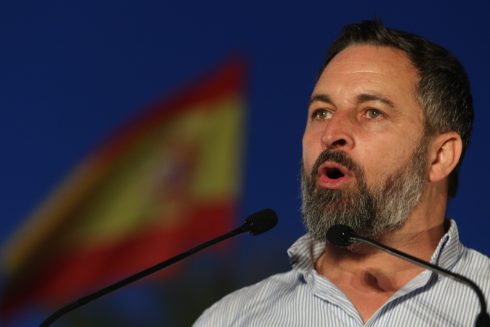THE LATEST POLLS ahead of the July 23 snap election in Spain suggest that the conservative Popular Party (PP) and far-right Vox party will win enough seats to form a government in the Congress of Deputies. But as the fallout from the local and regional elections is showing, making a deal could still be a complicated task.
In the Extremadura region, there was talk on Tuesday of a rerun of the recent election, after the PP and Vox failed to reach an agreement over the makeup of the speaker’s committee in the regional assembly. They voted for each other’s parties, meaning that the Socialist Party had the most votes and will take control of the committee.
In the wake of the falling out between the PP and Vox, regional PP leader Maria Guardiola complained that the far-right party has ‘put its lust for power first’ and that any kind of deal with Vox had been impossible.
The source of the disagreement was Vox’s policies on issues such as domestic violence and LGBTQ+ rights.

“I cannot allow those who deny that sexist violence exists to enter into the government,” added Guardiola. “[Nor those] who throw the LGBTQ+ flag in the bin.”
Vox wants to govern the regional government in Extremadura along with the PP, but the failure to reach a deal over the speaker’s committee and Guardiola’s harsh criticism of the group suggests a fresh election is on the cards.
What is happening this week in Extremadura could be a forerunner for the difficulties that the PP will face should, as is expected, the general election on July 23 be inconclusive.
PP leader Feijoo
The national PP leader, Alberto Nuñez Feijoo, opted to make a spirited defence of his party’s values earlier this week when being questioned about Vox’s attitudes to gender violence.
The questioning on the Cadena SER radio network came in the wake of the PP doing governing deals with Vox not just in dozens of local councils across the country after the recent polls, but also in the Valencia regional government.
“Sexist violence obviously exists,” said Feijoo, when asked about Vox’s claims that it doesn’t, as well as their insistence that measures to combat the issue be rolled back, despite the fact that in Spain so far this year 22 women have died at the hands of their partners or ex-partners.

Feijoo did, however, defend the PP’s decision in several city councils, including Valladolid and Toledo, to scrap equality departments altogether.
“Equality and family are not contradictory concepts, and nor does the family lead to inequality,” he argued during the radio interview. “There are governments where Economy and Finance go together, and others where they are separate.”
The PP leader would not be drawn on whether or not his party would do a coalition deal with Vox if needed – something that could be difficult given the far-right party’s recent policies and demands. He did, however, insist that the ball will lie in the court of the current prime minister, Pedro Sanchez of the Socialist Party, and that the most-voted party at the polls should govern.
‘The Socialists should abstain’
“Spain deserves to have a solid government so as not to waste time,” Feijoo said. “If the Socialists don’t want Vox to govern, it is simple: they should abstain [at an investiture vote]. If the Socialist Party wins, I will abstain.”
The issue of Vox caused another headache for Feijoo this week thanks to the governing deal it reached with the PP in Valencia. Jose Maria Llanos, one of the Vox deputies who may end up with a role of responsibility in the new regional government, last week said in a television interview that ‘gender violence doesn’t exist, sexist violence doesn’t exist’.
What’s more, another Vox politician in Valencia, Carlos Flores, was found guilty of domestic violence more than two decades ago.
In his Cadena SER interview, Feijoo brushed off the incident, stating that Flores had had ‘a difficult divorce’ that ‘involved verbal abuse toward his ex-wife.’ The comments prompted a wave of criticism aimed at Feijoo.
Sanchez’s strategy
When Pedro Sanchez called the snap elections after his party and other leftist groups’ poor showing at the local and regional polls, one of the interpretations by commentators was that he was doing so to get Spaniards out to vote at a time when the PP was being forced to do difficult deals with far-right Vox.
On the basis of what has been happening this week, it looks like Sanchez may have judged that decision well.
Read more:
- Spain’s shift to the right consolidated as local councils are formed across the country
- Unions concerned about low staffing to deal with postal votes for Spain’s general election in July
- After eight years, the Popular Party wins back the Balearics but will need the help of Vox to form government
Click here to read more Politics News from The Olive Press.








